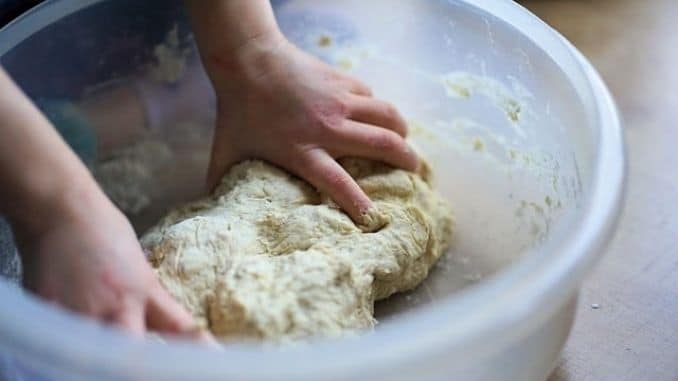
When Jeanne invited her brother and sister-in-law over for Thanksgiving dinner, she didn’t remember until later that her sister-in-law, Kirstin, was a vegan. Concerned she wouldn’t have what Kirstin needed at the meal, she called to ask her about her preferences. That’s when Jeanne heard about nutritional yeast for the first time.
“You mean like brewer’s yeast?” she asked, but Kirstin told her nutritional yeast was different.
“It’s awesome on popcorn,” she said. “If you have an air popper, make some. I’ll bring the yeast over, and you’ll see.”
Jeanne was game to give it a try, so prior to the dinner, she popped some popcorn. Sure enough, Kirstin was right. The nutritional yeast gave it a great flavor. That’s when Jeanne decided to look into this ingredient a bit more closely. Moreover, she found out that nutritional yeast could deliver health benefits to anyone, no matter what his or her preferred diet.
What Is Nutritional Yeast?
Yeast is a single-celled microorganism that’s part of a fungal species. To live, it needs food, warmth, and moisture and, when it has these things, the cells multiply rapidly, converting food (sugar and starch) through fermentation into carbon dioxide and alcohol. It is this fermentation process that makes yeast valuable in baking.
For thousands of years, people have used the yeast species Saccharomyces cerevisiae to produce alcoholic beverages and baked goods. When the yeast releases the carbon dioxide, it makes baked goods rise and gives beer its alcohol content and carbonation.
Nutritional yeast is also made from Saccharomyces cerevisiae, but it’s different from the yeast used in baking and brewing. In general, there are three types of yeast made from Saccharomyces cerevisiae:
- Baker’s yeast: This is a “live” or “active” yeast that is used to help bread and other baked goods rise. It is killed during cooking, but it also adds flavor to the final product.
- Brewer’s yeast: This is a live yeast that is used to brew beer, contributing to the fermentation process and the final alcohol and carbonate content. The process of brewing kills the yeast, but the leftover dead cells can still be used as a nutritional supplement.
- Nutritional yeast: This is a “dead” or “inactive” dried yeast that is grown and manufactured specifically for use as a food product. The cells are grown on a sugar-rich source like molasses, whey and sugar beets. The end product is dairy-free and gluten-free and can be used in cooking, for flavoring, as a condiment, and as a nutritional supplement.
Nutritional yeast comes in the form of yellow powder or flakes and can be found in the spice section of most natural or whole foods stores. It has a nutty, cheesy or creamy flavor, which is why vegans enjoy it as a cheese substitute and often add it to sauces. Also called “nature’s Cheeto dust,” it’s the only form of yeast that has an appealing flavor.
With only about 60 calories per two tablespoons, nutritional yeast, known for its rich nutrient profile, offers benefits such as enhanced immunity, improved digestion, and a plentiful source of B-vitamins, making it a nutritious addition to your diet.
- Fiber: About 4 grams of fiber
- High-quality protein: About 7.6 grams of protein, including all nine essential amino acids necessary for human survival
- B vitamins: Fortified nutritional yeast (the most common kind) usually contains thiamine, riboflavin, niacin, vitamin B6 and vitamin B12
- Minerals: A rich source of phosphorus; also contains a small amount of zinc, selenium, manganese, molybdenum and other minerals
- Antioxidants: Contains both glutathione and selenomethionine, powerful antioxidants that protect cells from free-radical damage
Fortified nutritional yeast (as opposed to unfortified) is typically preferred by vegans because it provides a good source of vitamin B, which is one of the critical vitamins missing from the vegan diet. In fact, studies have shown that following either a vegetarian or vegan diet puts people at risk for developing vitamin B12 deficiency, but nutritional yeast can help.
In a 2002 study, researchers tested about 50 vegans who were deficient in vitamin B12 and found that about one tablespoon of fortified nutritional yeast per day restored healthy levels.
5 Health Benefits of Nutritional Yeast
In addition to the nutritional benefits of yeast listed above, nutritional yeast can create health benefits in those who regularly consume it.
1. Supports the Immune System
The two main carbohydrates in nutritional yeast — alpha-mannan and beta-glucan — have shown in studies to help support the immune system and protect from infections. In general, they:
- Bind to receptors of immune cells, providing beneficial effects on health and resistance to disease
- Block pathogenic bacteria, preventing them from sticking around and lowering the risk of infections
- Absorb mycotoxins (poisonous substances produced by some molds), decreasing their toxic effects and helping to flush them out of the system
Nutritional yeast may be especially helpful for athletes wanting to stay healthy. Although moderate exercise helps boost immunity, intense exercise can actually weaken it, leaving athletes at a higher risk for infections.
In a 2012 study, scientists stated, “Strenuous aerobic exercise is known to weaken the immune system …,” so they tested beta-glucan as a post-exercise supplement. Results showed that the supplement helped boost immune function and could help minimize the negative effects of intense exercise.
Preliminary animal research also shows that these polysaccharides may have some anticancer properties. In 2011, scientists found that they enhanced antitumor immune responses.
2. Boosts Energy
Particularly if you’re deficient in vitamin B12, which is critical to maintaining energy, adding fortified nutritional yeast to your diet may help to boost your energy. A deficiency in vitamin B12 can lead to fatigue and muscle weakness.
In general, B vitamins support the metabolism of carbohydrates, fats, and proteins, helping to keep energy production efficiency. Adding nutritional yeast to a daily diet can help ensure a steady supply of B vitamins, which may keep metabolism humming along efficiently while maintaining steady energy levels.
3. Promotes Skin and Hair Health
Again, because of its vitamin B content, nutritional yeast can help support healthy skin, hair, and nails. The B vitamins are critical to skin health, ensuring healthy cell turnover, assisting with the production of ceramides and fatty acids in the skin, allowing the skin to hold onto moisture, reducing inflammation and managing the regular repair of the outer skin barrier.
Without enough of the B vitamins, skin can become dry, flaky, red, sensitive and inflamed. Hair turns dull and nails crack and break. Vegetarians, vegans and others that may be low in vitamin B may notice their skin, hair, and nails improving with more nutritional yeast in their diets.
4. Contributes to a Healthy Pregnancy
Fortified nutritional yeast is a good source of folic acid (or folate), another B vitamin that is particularly important in women of childbearing age. A deficiency in this vitamin in the early stages of pregnancy can increase the risk of birth defects like spina bifida.
The daily recommended amount of folic acid for women who are planning a pregnancy is 400 to 800 micrograms a day. Check labels as different brands of nutritional yeast are likely to have varying amounts of the nutrient. Always check with your doctor before adding it to your daily diet.
5. May Help Lower Cholesterol Levels
Although there are only a few studies on nutritional yeast and cholesterol, early results are interesting. It seems the beta-glucan in the yeast may help to keep cholesterol levels under control.
In a 2019 animal study, researchers found that the consumption of diets containing yeast-derived beta-glucan decreased blood cholesterol levels, even in subjects who started out with high cholesterol.
Many other studies on beta-glucan from oats have shown it helps lower cholesterol. Although the beta-glucan from yeast is different from the beta-glucan from oats, yeast is actually a more concentrated source of the nutrient.
How to Use Nutritional Yeast
If you’ve never used nutritional yeast before and you’re wondering how you might work it into your meals and snacks, here are a few ways to get started:
- Flavoring: Sprinkle it over popcorn, pasta or other snacks that need a cheesy flavor. You can also stir it into soups and sauces, rice dishes, roasted vegetables, mashed potatoes, grits, and bean dishes.
- In sandwiches: Sprinkle it on top of olive oil on toast or sandwiches, and then add lettuce and/or tomato.
- As a cream replacement: With any recipe that calls for cream, try using nutritional yeast instead to thicken the recipe and add some flavor.
- With tofu: Mix in some nutritional yeast with scrambled tofu, tomatoes, and potatoes for a flavorful breakfast.
- On salads: Sprinkle on top of some salads to make them tastier.
- In stir-fries: Add a tablespoon or two to a vegetable or tofu stir-fry. It will help absorb moisture while imparting some flavor.
- As a Parmesan cheese replacement: For any dish that calls for Parmesan cheese, substitute nutritional yeast for a low-calorie, low-fat substitute.
- As a general cheese replacement: You can also use it in vegan macaroni and cheese dishes and to make a vegan cheese sauce alternative.
- For lactose intolerance: If you’re lactose-intolerant, nutritional yeast can help you get your cheese fix without actually consuming cheese.
- In after-workout shakes: If you’re going through intense training and you’re worried about weakening your immune system, try making a post-workout shake with almond milk, berries, flaxseeds, bananas, greens, cinnamon and one or two tablespoons of nutritional yeast.
For your guide to the best foods to heal your body, check out The Best Foods that Rapidly Slim & Heal in 7 Days, here!
.







